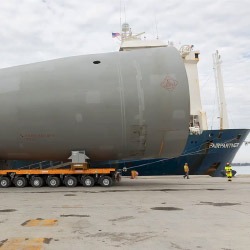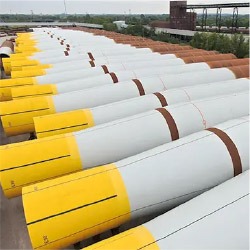ECONOMIC BENEFITS
OFFSHORE WIND REPRESENTS A ONCE-IN-A-LIFETIME GENERATION ECONOMIC OPPORTUNITY.
A typical offshore wind farm creates around 1,000 jobs per year over a 2-3 year construction period, and around 100 jobs for the 25 years it is operational, representing thousands of jobs over the life of a project.
Across the U.S. the industry is expected to grow to more than 44,000 workers and $12 billion in annual investment by 2030. Globally, the industry is expected to grow to $57 billion by 2026.
With its skilled workforce, central location along the east coast wind belt and best-in-class port infrastructure, New Jersey is optimally positioned to maximize its share of wind jobs and investment. By 2030, New Jersey is projected to have 20,000 workers in offshore wind, both to meet its own projects and to meet demand for goods and services across the east coast. Manufacturing is expected to account for more than half of these jobs. As with other major manufacturing sectors such as automobile and aviation, Tier 1 wind component manufacturers, such as nacelles, monopiles, towers and blades manufacturers, rely on an ecosystem of hundreds of smaller component suppliers and ancillary service providers, meaning opportunities for small- and medium-sized businesses across the state.
At full-scale, the NJWP is expected to create up to 1,500 ongoing manufacturing, stevedoring and operations jobs directly, and will indirectly support up to 20,000 wind sector jobs across the state.
2030: PROJECTED JOBS BY INDUSTRY
Manufacturing
Construction
Professional Services
Other supply chain
Induced
Source: New Jersey's Offshore Wind Workforce Assessment Through 2035, NJEDA 2022
2030: PROJECTED JOBS BY INDUSTRY
Manufacturing
Construction
Professional Services
Other supply chain
Induced
Source: New Jersey's Offshore Wind Workforce Assessment Through 2035, NJEDA 2022
CASE STUDY:
EEW'S MONOPILE FACILITY IN PAULSBORO
EEW, a global leader in manufacturing large-diameter steel pipes for offshore wind turbine foundations, selected Paulsboro, New Jersey as the base of its U.S. manufacturing operations. EEW’s 500,000-square-foot facility, the first and largest facility of its type in the U.S., will have capacity to produce 100 monopiles a year and will employ more than 500 highly skilled workers. Paulsboro is sited on the Delaware River approximately 35 miles north-east of the NJWP.


CASE STUDY:
EEW'S MONOPILE FACILITY IN PAULSBORO
EEW, a global leader in manufacturing large-diameter steel pipes for offshore wind turbine foundations, selected Paulsboro, New Jersey as the base of its U.S. manufacturing operations. EEW’s 500,000 square foot facility, the first and largest facility of its type in the U.S., will have capacity to produce 100 monopiles a year and will employ more than 500 highly skilled workers. Paulsboro is sited on the Delaware River approximately 35 miles north-east of the NJWP.



